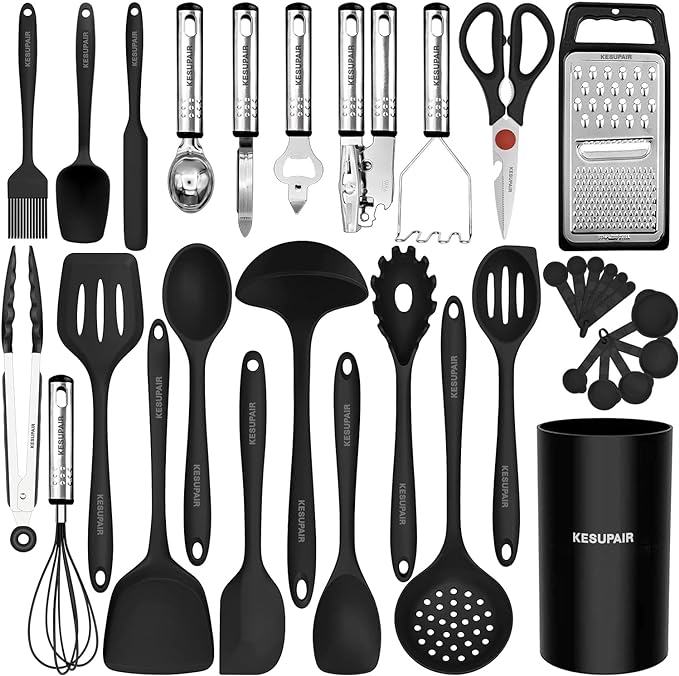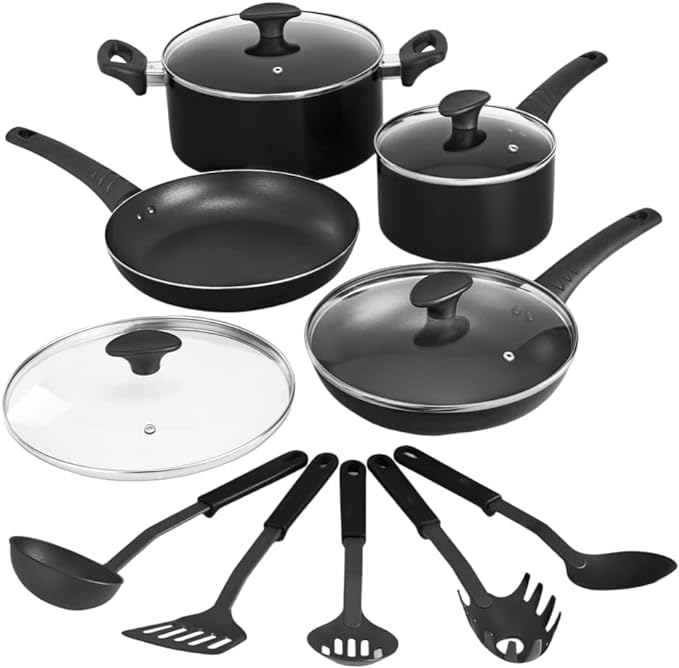Click Here Kitchen 1 to access the best Cooking utensils and kitchen gadgets on Amazon or search through for your choice of tools, utensils or cook wares.
Cooking your own food allows you to know exactly what you put in yours and your family’s bodies. But the kitchen can also be overwhelming, both for experienced and newbie chefs.
This is simply because the cooking utensils you use can have significant effect on your nutrition. Pots, pans and other tools used in cooking do more than just hold the food. The materials they are made from can leach into the food that is being cooked. Yes, cooking utensils can affect any cooked foods.

Common materials used in cookware and utensils are:
– Aluminium
– copper
– Iron
– Lead
– Stainless steel
– TeflonTM (polytetrafluoroethlyene)
Both lead and copper have been linked to illness.
Click Here for Immediate Access to Amazon’s Best Cooking Utensils
Recommendations
When choosing metal cookware and bakeware, choose those that can be easily cleaned. There should be no cracks or rough edges that can trap or hold food or bacteria.
Avoid using metal or hard plastic utensils on cookware. These utensils can scratch surfaces and cause pots and pans to wear out faster. Use wood, bamboo or silicone instead. Never use a cookware if the coating has started to peel or wear away.

Aluminium
Aluminium cookware is very popular. Non-stick, scratch-resistant anodized aluminium cookware is a good choice. The hard surface is easy to clean. It is sealed so aluminium cannot get into food.
There have been concerns in the past that aluminium cookware increases the risk for Alzheimer’s disease.
The Alzheimer’s Association reports that using aluminium cookware is not a major risk for the disease.
Uncoated aluminium cookware is a greater risk. This type of cookware can easily melt. It can cause burns if it gets too hot. Still, research has shown that the amount of aluminium this cookware leaches into food from is very small.
Copper
Copper pots are popular due to their even heating. But large amounts of copper from unlined cookware can cause nausea, vomiting, and diarrhea.
Some copper and brass pans are coated with another metal to prevent food from coming into contact with copper. Over time, these coatings can break down and allow copper to dissolve in food. Older copper cookware may have tin or nickel coatings and should not be used for cooking.
Click Here for Immediate Access to Amazon’s Best Cooking Utensils
Iron
Iron cookware may be a good choice. Cooking Cast iron pots may increase the amount of iron in the diet. Most of the time, this is a very small source of dietary iron.
Lead
Children should be protected from ceramic cookware containing lead.
– Acidic foods such as oranges, tomatoes, or foods containing vinegar will cause more lead to be leached from ceramic cookware more than non-acidic foods like milk.
– More lead will leach into hot liquids like coffee, tea, and soups than into cold beverages.
– Do not use any dishware that has a dusty or chalky gray film on the glaze after it has been washed.
Some ceramic cookware should not be used to hold food. This includes items bought in another country or considered to be a craft, antique, or collectable. These pieces may not meet FDA specifications. Test kits can detect high levels of lead in ceramic cookware, but lower levels may also be dangerous.
Stainless Steel
Stainless steel cookware is low in cost and can be used at high heat. It has a sturdy cookware surface that does not wear down easily. Most stainless steel cookware has copper or aluminium bottoms for even heating. Health problems from stainless steel are rare.
Teflon™
Teflon™ is a brand name for a non-stick coating found on certain pots and pans. It contains a substance called polytetrafluoroethlyene.
The non-stick types of these pans should be used only at low or medium heat. They should never be left unattended at high heat. This may cause the release of fumes that can irritate humans and household pets. When left unattended on the stove, empty cookware can heat up to 800 degrees within 5 minutes.
There have been concerns about a possible link between Teflon™ and perfluorooctanoic acid (PFOA), a man-made chemical. The Environmental Protection Agency states that Teflon™ does not contain PFOA so the cookware poses no danger.
Click here Kitchen to select from the best kitchen tools and kitchen gadgets on Amazon
Very educative and entertaining piece of article.
Thank you.
https://johnnywhittaker.fatlosswithease.com